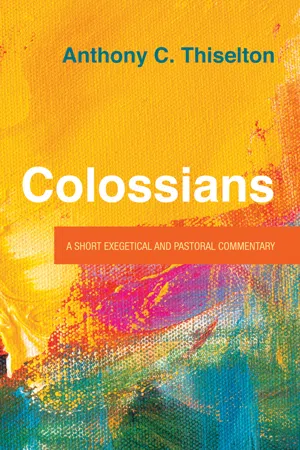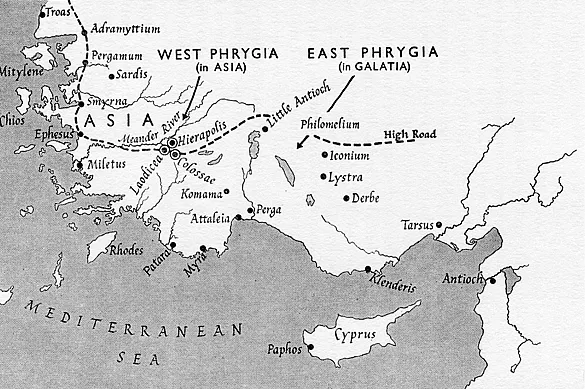
eBook - ePub
Colossians
A Short Exegetical and Pastoral Commentary
Anthony C. Thiselton
This is a test
Compartir libro
- 138 páginas
- English
- ePUB (apto para móviles)
- Disponible en iOS y Android
eBook - ePub
Colossians
A Short Exegetical and Pastoral Commentary
Anthony C. Thiselton
Detalles del libro
Vista previa del libro
Índice
Citas
Información del libro
In this clear, practical, and brief commentary, Anthony Thiselton brings to bear his intimate knowledge of Paul's theology, the ancient city of Colossae, and Paul's epistle to the church of that city. The commentary offers a new translation from the Greek, and explorations of an exegetical as well as a pastoral and practical nature on all passages of the book. Each section concludes with questions for further reflection.
Preguntas frecuentes
¿Cómo cancelo mi suscripción?
¿Cómo descargo los libros?
Por el momento, todos nuestros libros ePub adaptables a dispositivos móviles se pueden descargar a través de la aplicación. La mayor parte de nuestros PDF también se puede descargar y ya estamos trabajando para que el resto también sea descargable. Obtén más información aquí.
¿En qué se diferencian los planes de precios?
Ambos planes te permiten acceder por completo a la biblioteca y a todas las funciones de Perlego. Las únicas diferencias son el precio y el período de suscripción: con el plan anual ahorrarás en torno a un 30 % en comparación con 12 meses de un plan mensual.
¿Qué es Perlego?
Somos un servicio de suscripción de libros de texto en línea que te permite acceder a toda una biblioteca en línea por menos de lo que cuesta un libro al mes. Con más de un millón de libros sobre más de 1000 categorías, ¡tenemos todo lo que necesitas! Obtén más información aquí.
¿Perlego ofrece la función de texto a voz?
Busca el símbolo de lectura en voz alta en tu próximo libro para ver si puedes escucharlo. La herramienta de lectura en voz alta lee el texto en voz alta por ti, resaltando el texto a medida que se lee. Puedes pausarla, acelerarla y ralentizarla. Obtén más información aquí.
¿Es Colossians un PDF/ePUB en línea?
Sí, puedes acceder a Colossians de Anthony C. Thiselton en formato PDF o ePUB, así como a otros libros populares de Theologie & Religion y Biblischer Kommentar. Tenemos más de un millón de libros disponibles en nuestro catálogo para que explores.
Información
Categoría
Theologie & ReligionCategoría
Biblischer KommentarPart I
INTRODUCTION
Introduction
A. The Church at Colossae

Colossae was a city of Phrygia, about 150 miles to the east of Ephesus, thirteen miles to the northeast of Hierapolis, and ten or eleven miles to the west of Laodicea. The city was in the Southern part of the Roman Province of Asia, or in modern Turkey. Colossae was once a city of great importance and wealth but was overtaken in size by Hierapolis and Laodicea. The earlier wealth of Colossae four or five centuries previous was due to its position on the main road from Ephesus and Sardis to the Euphrates and to its wool industry.1 All three cities were situated in the valley of the River Lycus, a tributary of the river Meander. Colossae would have benefitted from the stream of travelers who brought news and currents of thought to the Lycus Valley from afar. Laodicea became the financial and administrative center of the three cities. Meanwhile Hierapolis attracted many visitors because of its hot mineral springs. However, by Paul’s time Strabo and Pliny described Colossae as a small town.2 Philo and Josephus indicate that there were Jewish colonies in these cities of Phrygia, although the church of Colossae was predominantly gentile when Paul wrote. Colossae, though small, was relatively prosperous, exporting wool and a highly prized purple dye.
Although he preached in Phrygia, we have no record that Paul ever visited Colossae, though it is possible that he passed through the city without pausing to preach. According to Acts 19:10, Paul made Ephesus his center for operations for two years. His letter to the believers in Colossae was prompted when he received a report of the church from Epaphras, probably when Paul was under guard or in prison in Rome. Epaphras was probably the founder of the Colossian church (Col 1:6–7), perhaps around about the mid-50s. We need not imagine that Paul’s audience was a single gathering of Christians for there may have been more than one house church in Colossae.
What concerned Paul enough to write to a church that he himself had not founded? A. S. Peake writes, “Recently they [the Colossians] had been assailed by a form of false teaching, and while they remained, so far, loyal to the doctrine they had been taught (1:4; 2:5), the danger was sufficiently serious to call forth this letter.”3
B. The False Teaching, Formerly Called
“The Colossian Heresy”
“The Colossian Heresy”
Dunn writes, “There has been a long tradition of speaking of ‘the Colossians heresy’ or ‘false teaching’ as that which Paul sought to attack and refute, a tradition that continues to the present. The language is potentially misleading.”4 He argues this on two grounds. First, there was once a clear conception of what Christian orthodoxy embodied with clearly delineated boundaries which marked off “Christianity” from other religious groupings. He argues, “such a view can no longer be sustained, at least in that simple form.”5 Dunn claims that earliest Christianity itself contained a large measure of diversity. He has written extensively on this theme.6 Dunn’s position is understandable in the light of subsequent over-tight notions of orthodoxy. However, departures from Pauline Christianity clearly characterize Paul’s opponents in Colossae. We can avoid the term “heresy” without losing Paul’s concern for right or correct Christology.
Second, Dunn argues that according to the older view the c...